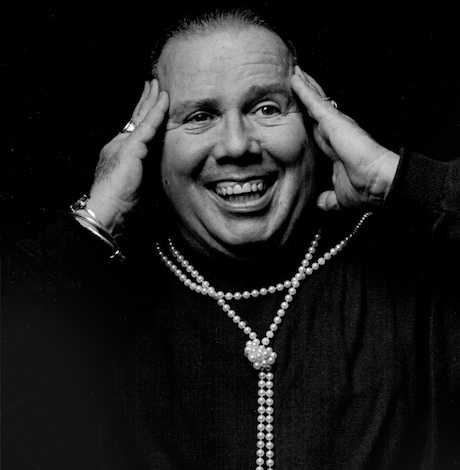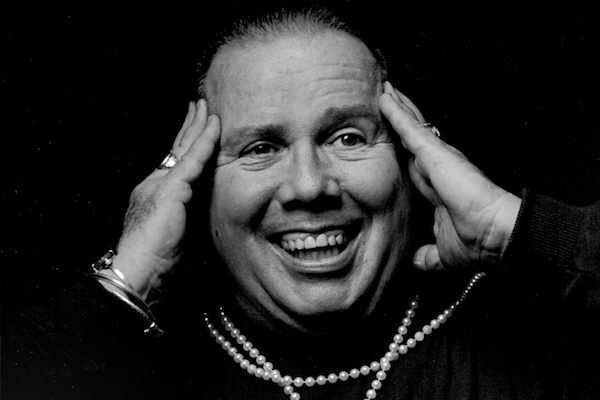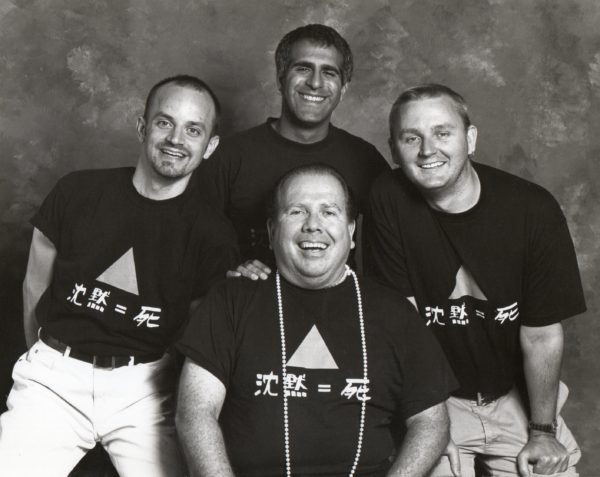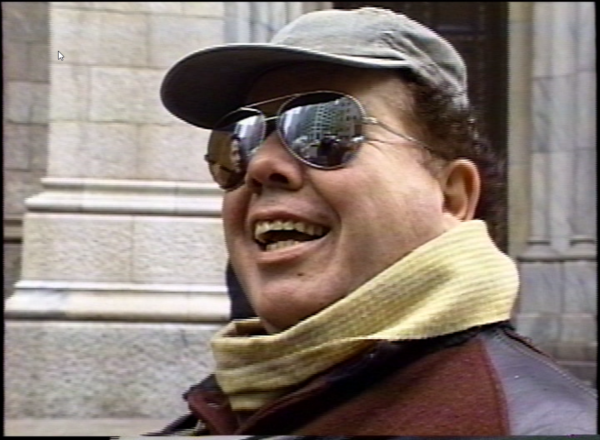News
Andy Vélez, a seminal New York AIDS and Latino Queer activist dies at 80
His advocacy work improved drug access and civil rights for people living with HIV


Andy Vélez, an internationally prominent AIDS activist, whose three decades of advocacy work resulted in improved drug access and civil rights for people living with HIV, especially in the Latino community, died on May 14, 2019 at Mt. Sinai Beth Israel Hospital in Manhattan. He was 80.
His sons Ben and Abe Vélez said the cause of death was complications arising from a severe fall in his Greenwich Village building in April.
Until his recent accident and despite several health challenges, Vélez had remained consistently active in the AIDS and social justice communities, taking part in protests for ACT UP and Rise and Resist. Vélez was a seminal member of ACT UP, joining the group in 1987, its first year of activity, and played a prominent role in its most notorious demonstrations over the past 32 years.

Vélez was born on March 9, 1939 in the Bronx to Ramon Vélez and the former Dorothy Solomon. The family, including siblings Eugene and Raymond (“Al”), soon relocated to Aguadilla, Puerto Rico, where they lived a few years before returning to the Bronx. Vélez graduated from William Howard Taft High School in 1955 at age 16. He attended City College for a brief time, but interrupted his studies when he left home. Years later, after attending night school, Vélez would formally graduate.
Vélez earned a Master’s degree in psychoanalysis in 1976 and worked with the Center for Modern Psychoanalytic Studies under Dr. Phyllis Meadow in the Village. He maintained his own therapy practice for two decades. Vélez had initially explored psychoanalysis for personal reasons, suspecting that he was homosexual. In 1964, he was entrapped by an undercover policeman in a Park Avenue South bar. Vélez spent the night in the jail facility known as The Tombs, a traumatizing experience that would provide the impetus for his activism. Vélez lost his position at the Housing Authority when his boss learned of his arrest. He received a suspended sentence of six months. But when Vélez pushed back legally with the help of a progressive lawyer, his conviction was later reversed.
While he initially hoped to become an actor, and appeared in several off-Broadway productions in the late 1950s and early 1960s, Vélez found success in other careers. He entered book publishing in 1969. Over the course of 16 years he worked his way up to the position of president of the prominent Frederick Ungar Publishing, managing the company until it was sold in 1985. Notable among his literary projects was a 1984 collaboration with screen star Marlene Dietrich to update her 1962 bestseller Marlene Dietrich’s ABC.

Once he was divorced, Vélez began to make active connections with the LGBTQ community. He served as a leader for the Gay Circles Consciousness Raising Group for almost three years. One evening, after his group ended, Vélez walked past the first meeting of a new organization dedicated to addressing government inaction surrounding HIV/AIDS. He was intrigued.
The group soon had a name: ACT UP, the AIDS Coalition to Unleash Power. Vélez became involved in several ACT UP committees, including the Media Committee and Actions Committee. He was involved in high-profile demonstrations and civil disobedience arrest scenarios that showcased ACT UP’s signature street theatre activism, such as chaining himself in the office of a pharmaceutical company, or covering himself in fake blood to symbolize the lives lost to AIDS because of government negligence.
However, Vélez found his niche with the group’s Latino Caucus, which focused on the raging but neglected epidemic in the Latino community. Significantly, Vélez and his colleagues traveled to Puerto Rico to help organize a local ACT UP chapter in the commonwealth. He was also a founding member of Queer Nation in New York City in 1990.
He was involved in many AIDS educational and service organizations over the years, serving as an administrator and bilingual educator for AIDSMEDS.com for more than a decade. His writing and activism intersected significantly when he moderated a community forum on AIDSMeds.com, where he directed desperate people to lifesaving medical information. Vélez also wrote about the epidemic for numerous community publications, including POZ, Body Positive, and SIDA Ahora. For ten years he moderated the POZ Forum. He took part in aggressive and effective treatment access work with Treatment Action Group, and worked in a New York City HIV clinical trial unit, alerting affected communities to their vulnerability to tuberculosis.
From the 1990s through the 2010s, Vélez returned to his first love of theater by covering the scene for several LGBT magazines, as well as by conducting interviews with jazz greats for All About Jazz and the New York City Jazz Record. He penned liner notes for the CD reissues of several Broadway musical classics, such as Finian’s Rainbow, The Pajama Game, and Saratoga. He also provided liner notes for vocal collections by legends such as Doris Day, Fred Astaire, Ella Fitzgerald, and Artie Shaw. From 1990 to 1992, he taught courses in musical theater at the New School. Among his in-class guests from the golden age of Broadway: Barbara Cook, Sheldon Harnick, Elaine Stritch, John Kander and Fred Ebb. He was included in the anthology Cast Out: Queer Lives in the Theater, a collection focusing on out lesbians and gays currently working on the American stage.
Vélez became a prominent presence on the international AIDS scene for more than two decades, working with co-organizers of the International Conference on AIDS to guarantee the inclusion and active participation of people with HIV. He also served for several conferences as the official liaison to the activist community. He served as a consultant to the Latino Commission on AIDS, and was a guest speaker on HIV/AIDS issues at high schools and colleges across America.
Years ago, when asked how he would like to be remembered, Vélez replied, “As someone who was able to help.”

Andy Vélez is survived by his sons Ben and Abe, both of Brooklyn, his daughter-in-law Sarah, his granddaughter, his younger brother Eugene (“Gene’) of Alamo, California, as well as thousands of comrades in the global AIDS and LGBTQ activist communities.
Funeral services will be private. A public memorial service will be held this summer.
Donations in Vélez’s memory may be made to ACT UP New York, Broadway Cares/Equity Fights AIDS, and the Latino Commission on AIDS.
Andy Vélez, presente y pa’lante!
The White House
Hundreds protest ICE killing of Renee Nicole Good in D.C.
Married queer woman shot in Minneapolis on Wednesday

Hundreds of people took to the streets of D. C. on Thursday night to protest the killing of a U.S. citizen by a U.S. Immigration and Customs Enforcement agent.
Protests began at the busy — and increasingly queer — intersection of 14th and U Streets, N.W. There, hundreds of people held signs, shouted, and made their way to the White House to voice their dissent over the Trump-Vance administration’s choice to increase law enforcement presence across the country.
The protest, which also occurred simultaneously in cities large and small across the country, comes in the wake of the death of Minneapolis resident Renne Nicole Good at the hands of ICE Agent Jonathan Ross. Good left behind two children and a wife, Rebecca Good.
Records obtained by the Associated Press found that Ross was an Iraq War veteran and nearly two decades into his career with U.S. Border Patrol and ICE.
Good was gunned down just blocks away from where George Floyd was killed by police in 2020, sparking weeks of national protests. Minnesota officials say the FBI has blocked their access to an investigation into the fatal shooting, according to a BBC story published on Friday.
In the nation’s capital, protesters marched from the intersection of 14th and U Street to Lafayette Square, right outside the White House. Multiple D.C. organizations led the protest, most notably Free DC, a nonprofit that works to ensure the right of “self-determination” for District residents, as many local laws can be reviewed, modified, or overturned by Congress. Free DC had organized multiple protests since the Trump-Vance administration was elected.
The Washington Blade spoke to multiple protesters towards the tail end of the protest about why they came out.
Franco Molinari, from Woodbridge, Va., crossed the Potomac to partake in his first-ever protest.
“I don’t appreciate ICE and the use of federal agents being pretty much militarized against America,” Molinari said while holding a “Justice for Renee” sign. “The video of Renee being executed cartel style in her car was enough for me to want to come out, to at least do something.”
Molinari, like many others the Blade spoke with, found out about the protest on Instagram.
“It was my friend there, Sarah … had sent a link regarding the protest to a group chat. I saw it in the morning, and I thought, ‘You know what, after work, I’m head out.’”
He also shared why protesting at the White House was important.
“I already saw the response that the president gave towards the murder of Renee, and it was largely very antagonizing,” Molinari said.
President Donald Trump, along with federal leaders under him, claimed that Good “violently, willfully and viciously ran over the ICE officer.” The president’s claims have been widely discredited through multiple videos of the incident, which show Good was attempting to leave the scene rather than attacking the officer.
“I hope that anybody would be able to see that and see the response and see for themselves that it just is not correct,” Molinari said.
The Blade also spoke with leftist influencer Dave the Viking, who has more than 52,000 followers on TikTok, where he posts anti-fascist and anti-Trump videos.
“We’re out here to make sure that this regime can’t rewrite history in real time, because we all know what we saw … we’re not going to allow them to run with this narrative that they [ICE agents] were stuck in the snow and that that poor woman tried to weaponize her car, because we all saw video footage that proves otherwise,” he told the Blade. “We’re not going to let this regime, the media, or right-wing influencers try to rewrite history in real time and try to convince us we didn’t all see what we know we saw.”
Dave the Viking continued, saying he believes the perceived power of ICE and other law enforcement to act — oftentimes in deadly and unjustifiable ways — is a product of the Trump-Vance administration.
“There’s a line between fascism and anti-fascism. These motherfuckers have been pushing that envelope, trying to label an idea a terrorist organization, to the point of yesterday, crossing that line hardcore. You face the point of looking at history and saying there was this 1989, 2003 America, where we’re just going in, raiding resources. Where is this fucking 1930s Germany, where we’re going in and we’re about to just start clearing shit and pulling knots? Yeah, nope. We proved that shit yesterday.”
Two people were injured in another shooting involving federal agents, this time Border Patrol in Portland, Ore., on Thursday afternoon.
KC Lynch, who lives near American University, also spoke about her choice to protest with a group.
“I came out today because everything that ICE has done is absolutely unacceptable, not only killing this one woman, but also the fact that they’ve been imprisoning people in places that are literally, that have been literally on record by international organizations shown to be human rights violating. It’s unbelievably evil.”
Lynch also echoed Dave’s opinion about parallels between the Trump-Vance administration and the rise of Adolf Hitler in Nazi Germany.
“It’s literally what happened before the Holocaust. We should all be scared. We should all be angry. I’m so angry about it … even talking about it — I’m sorry,” she said before getting choked up.
Lynch emphasized that despite the circumstances in which people were protesting together, the sense of community was strong and powerful.
“I feel like it’s important for people to know that we’re angry, even if no policy changes come out of it, and it’s just nice to yell and be angry about it, because I feel like we’ve probably all been feeling this way, and it’s nice to be around people that are like minded and to like have a sense of community.”
Venezuela
AHF client in Venezuela welcomes Maduro’s ouster
‘This is truly something we’ve been waiting for’ for decades

An AIDS Healthcare Foundation client who lives in Venezuela told the Washington Blade he welcomes the ouster of his country’s former president.
The client, who asked the Blade to remain anonymous, on Thursday said he felt “joy” when he heard the news that American forces seized Nicolás Maduro and his wife, Cilia Flores, at their home in Caracas, the Venezuelan capital, during an overnight operation on Jan. 3.
“This is truly something we’ve been waiting for for 26 or 27 years,” the AHF client told the Blade.
Hugo Chávez became Venezuela’s president in 1999. Maduro succeeded him in 2013 after he died.
“I’ve always been in opposition,” said the AHF client, who stressed he was speaking to the Blade in his personal capacity and not as an AHF representative. “I’ve never agreed with the government. When I heard the news, well, you can imagine.”
He added he has “high hopes that this country will truly change, which is what it needed.”
“This means getting rid of this regime, so that American and foreign companies can invest here and Venezuela can become what it used to be, the Venezuela of the past,” he said.
The AHF client lives near the Colombia-Venezuela border. He is among the hundreds of Venezuelans who receive care at AHF’s clinic in Cúcuta, a Colombian city near the Táchira River that marks the border between the two countries.
The Simón Bolívar Bridge on the Colombia-Venezuela border on May 14, 2019. (Washington Blade video by Michael K. Lavers)
The AHF client praised U.S. President Donald Trump and reiterated his support for the Jan. 3 operation.
“It was the only way that they could go,” he said.
The Venezuelan National Assembly on Jan. 4 swore in Delcy Rodríguez, who was Maduro’s vice president, as the country’s acting president. The AHF client with whom the Blade spoke said he is “very optimistic” about Venezuela’s future, even though the regime remains in power.
“With Maduro leaving, the regime has a certain air about it,” he said. “I think this will be a huge improvement for everyone.”
“We’re watching,” he added. “The actions that the United States government is going to implement regarding Venezuela give us hope that things will change.”
Minnesota
Reports say woman killed by ICE was part of LGBTQ community
Renee Nicole Good shot in Minneapolis on Wednesday

A U.S. Immigration and Customs Enforcement agent shot and killed a woman in Minneapolis as she attempted to drive away from law enforcement during a protest on Wednesday.
The Star Tribune newspaper identified the victim as Renee Nicole Good, 37, a Minneapolis resident who lived blocks from where she was shot in the Central neighborhood, according to reports. Donna Ganger, Good’s mother, told the Star Tribune that her daughter lived in the Twin Cities with her wife.
Multiple videos of the shooting have gone viral on social media, showing various angles of the fatal incident — including footage that shows Good getting into her car and attempting to drive away from law enforcement officers, who had their weapons drawn.
In the videos, ICE agents can be heard telling Good to “get out of the fucking car” as they attempted to arrest her. Good, who press reports say was married to a woman, ended up crashing her car into an electric pole and other vehicles. She was later transported from the scene of the shooting and died at the hospital.
President Donald Trump defended the ICE agent on Truth Social, saying the officer was “viciously” run over — a claim that coincides with Homeland Security Secretary Kristi Noem’s assessment of the situation. Noem, a South Dakota Republican, insisted the officer “fired defensive shots” at Good after she attempted to run over law enforcement agents “in an attempt to kill them — an act of domestic terrorism.”
Multiple state and local officials disputed claims that the shooting was carried out in self-defense at the same time Noem was making those assertions.
An Instagram account that appears to belong to Good describes her as a “poet and writer and wife and mom and shitty guitar strummer from Colorado; experiencing Minneapolis, MN,” accompanied by a rainbow flag emoji.
A video posted to X after the shooting shows a woman, reportedly her wife, sitting on the ground, crying and saying, “They killed my wife. I don’t know what to do.”
“We’ve dreaded this moment since the early stages of this ICE presence in Minneapolis,” Mayor Jacob Frey said during a Wednesday press conference. “Having seen the video myself, I want to tell everybody directly that [the DHS’s claim of self-defense] is bullshit. This was an agent recklessly using power that resulted in somebody dying, getting killed.”
“I have a message for ICE. To ICE, get the fuck out of Minneapolis,” Frey continued. “We do not want you here. Your stated reason for being in this city is to create some kind of safety, and you are doing exactly the opposite. People are being hurt. Families are being ripped apart. Long-term Minneapolis residents that have contributed so greatly to our city, to our culture, to our economy are being terrorized, and now somebody is dead. That’s on you, and it’s also on you to leave.”
Across the Capitol, members of the House and the Senate condemned the actions of the officer.
“There’s no indication she’s a protester, there’s nothing that at least you can see on the video, and therefore nothing that the officers on the ground could see that identify her as someone who’s set out to try to do harm to an ICE officer,” U.S. Sen. Elizabeth Warren (D-Mass.) said Wednesday night on MS NOW’s “The Weeknight.”
“There is no evidence that has been presented to justify this killing,” House Minority Leader Hakeem Jeffries (D-N.Y.) said in a statement on his website. “The masked ICE agent who pulled the trigger should be criminally investigated to the full extent of the law for acting with depraved indifference to human life.”
“ICE just killed someone in Minneapolis,” U.S. Rep. Robert Garcia (D-Calif.) the highest-ranking Democrat on the House Oversight Committee, posted on X. “This administration’s violence against communities across our country is horrific and dangerous. Oversight Democrats are demanding answers on what happened today. We need an investigation immediately.”
In a statement to the Advocate, Human Rights Campaign President Kelley Robinson wrote, “Today, a woman was senselessly killed in Minneapolis during an ICE action — a brutal reminder that this agency and the Trump regime put every community at risk, spreading fear instead of safety. Reports that she may have been part of the LGBTQ+ community underscore how often the most vulnerable pay the highest price.”
National LGBTQ Task Force President Kierra Johnson also responded to Good’s death.
“We recognize and mourn the loss of Renee Nicole Good and extend our condolences to her family, loved ones, and community,” said Johnson in a statement. “This loss of life was preventable and reprehensible, particularly coming at the hands of federal agents.”
-

 National5 days ago
National5 days agoWhat to watch for in 2026: midterms, Supreme Court, and more
-

 District of Columbia5 days ago
District of Columbia5 days agoImperial Court of Washington drag group has ‘dissolved’
-

 Colombia4 days ago
Colombia4 days agoGay Venezuelan man who fled to Colombia uncertain about homeland’s future
-

 Arts & Entertainment4 days ago
Arts & Entertainment4 days ago2026 Most Eligible LGBTQ Singles nominations




















